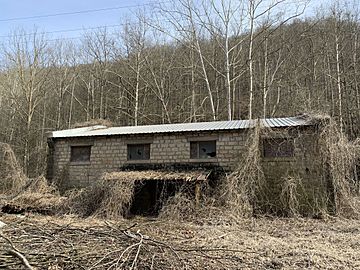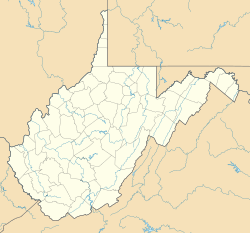Ethel, West Virginia facts for kids
Quick facts for kids
Ethel, West Virginia
|
|
|---|---|
|
Ethel Coal Company Supply Building, 2020
|
|
| Country | United States |
| State | West Virginia |
| County | Logan |
| Elevation | 823 ft (251 m) |
| Time zone | UTC-5 (Eastern (EST)) |
| • Summer (DST) | UTC-4 (EDT) |
| ZIP code |
25076
|
| Area code(s) | 304 & 681 |
| GNIS feature ID | 1554414 |
Ethel is a small community in Logan County, West Virginia, in the United States. It's not a city or town with its own government, which is why it's called an "unincorporated community." You can find Ethel about 4.5 miles (7.2 km) east-northeast of Logan, along West Virginia Route 17. The community even has its own post office with the ZIP code 25076.
Contents
Ethel's Location and Landscape
Ethel is found in a beautiful part of West Virginia. It was first located where a stream called Left Fork (now Ethel Hollow) meets Dingess Run. Today, the community includes several smaller areas like Camp Branch and Freeze Fork. Ethel is also situated right at the base of Blair Mountain, a famous historical site.
Ethel's Early Days
In the 1890s, some smart business people bought a lot of land around Dingess Run and Rum Creek. They found excellent coal under the ground, with six different layers of coal that could be mined. These layers included the Lewis-Stockton, Chilton, and Eagle Seams.
In 1903, these business people created the Dingess-Rum Coal Company. This company managed over 26,000 acres of land. They planned for a railroad to be built up Dingess Run, and by late 1906, the C&O Railroad had laid its tracks. The railroad then stretched further into the area. Around 1907, the company town of Ethel was started. It was named after the daughter or wife of an early coal mine owner.
The Ethel Coal Company
The Ethel Coal Company began in 1906. From 1907 to 1916, they ran two mines, No. 1 and No. 2, in Ethel Hollow. During this time, they built houses for their workers in Ethel Hollow. They also built the Ethel No. 1 Company Store, and you can still see its ruins today.
Around 1914, skilled Italian stonemasons built the Ethel Coal Company Supply Building. This building is one of the few original landmarks left in Ethel. In 1915, the Ethel Coal Company had 184 workers. Almost half of these workers were immigrants, with many coming from Hungary and Italy. About one-sixth of the workers were African-Americans.
Other Coal Companies in Ethel
The Logan Coal Company also operated a mine called Logan No. 1 from 1908 to 1916. This mine was located at the entrance of Ethel Hollow. The Logan Coal Company did not hire many immigrants. In 1916, the Ethel Coal Company took over the Logan No. 1 mine.
Later, the Cleveland Cliffs Iron Company took over the Ethel Coal Company's mines from 1918 to 1929. This company was very efficient at mining coal. In 1925, they produced over 525,000 tons of coal with only 224 workers. This means each worker produced a lot of coal! However, the Great Depression caused most of their mining operations to stop.
Ethel's Role in the Battle of Blair Mountain
Ethel, being at the base of Blair Mountain, played a part in the famous Battle of Blair Mountain. This was a major conflict between coal miners and coal companies in 1921.
Don Chafin, the Sheriff of Logan County, set up defense posts in different places. One of these posts was at the Cleveland Cliffs Company Store No. 2, located at the entrance of Ethel Hollow. On August 27, 1921, a group of over 200 state police and deputies left the Ethel post. They were led by Captain J.R. Brockus and were going to serve warrants to union leaders.
On August 28, 1921, a man named John L. Rice shot State Police private George Duling near the Ethel Coal Company Supply Building. Duling was hit in the head while sitting on a porch. Sheriff Don Chafin arrested Rice, but he decided it was an accident. The supply building was used as a meeting and preparation area for the forces defending against the miners during the battle.
Life in Ethel in the 1920s
In 1923, Ethel was a busy community with about 2,000 people living there. It had a Methodist Episcopal church and was connected by the C&O Railroad. The community had several businesses, including the Ethel Theatre, where people could watch movies. There were also different coal companies operating, like Georges Creek Coal Company. Two doctors, Dr. W.T. McClellan and Dr. E.B. Thompson, served the community's health needs. Ethel even had its own high school during the 1920s.
Later Coal Mining Operations
After the Cleveland Cliffs Iron Company, other companies continued to mine coal in Ethel. The Ethel Block Coal Company operated a mine from 1931 to 1932. Then, the Chilton Block Coal Company took over in 1933 and operated mines until 1941. They produced a lot of coal, but not as much as Cleveland Cliffs had. During this time, some older mining buildings were taken down.
In 1941, the Chilton Block Coal Company went bankrupt. A banker named A.J. McCalla then managed the company's affairs. He later formed the Chilton Coal Company and Ethel Chilton Mines, Inc., to keep the mines running. In 1949, the A.T. Massey Coal Company, Inc. became the main sales agency for Ethel Chilton Mines. They handled the coal sales until the mines finally closed in 1962.
Ethel in Recent Times
In 1962, C.F. Colley, who used to manage the store for Ethel Chilton Mines, leased the Ethel Coal Company Supply Building. He started his own business, Colley Equipment Company. He would buy used mining equipment, fix it up in the stone building, and then sell it again. He leased the building until 1986. After him, Cook Electric Maintenance Company leased the building for two years.
Ethel Today
Today, only a few buildings from Ethel's past still stand. These include the Ethel Coal Company Supply Building and the ruins of the Ethel No. 1 Company Store. The Ethel Post Office is still open and located near Bearwallow Branch.
A popular attraction in the area is the Bearwallow Trailhead. It opened in 2000 and is part of the Hatfield-McCoy Trails, which are popular for ATV riding. It's located in the upper parts of Bearwallow Branch.
Notable Person from Ethel
John C. Gore (1873-1921) was a deputy sheriff. He is buried at Ethel Cemetery on Mash Branch.
 | Misty Copeland |
 | Raven Wilkinson |
 | Debra Austin |
 | Aesha Ash |




